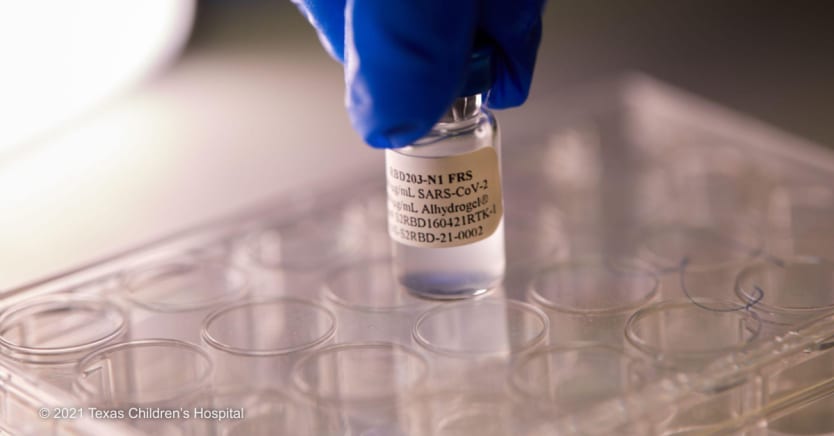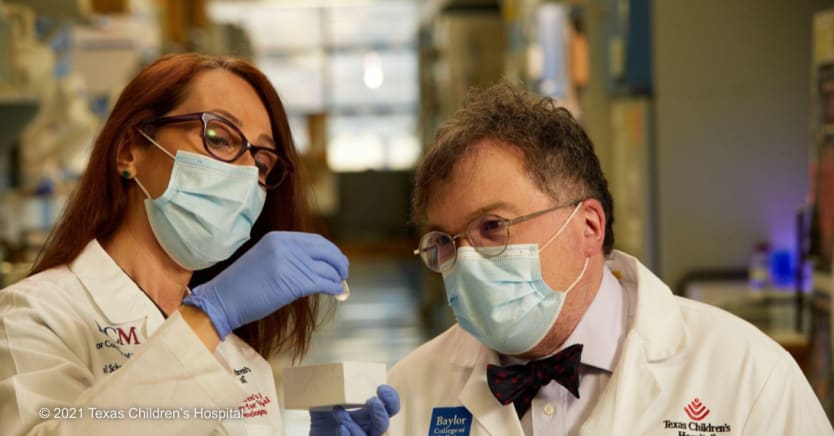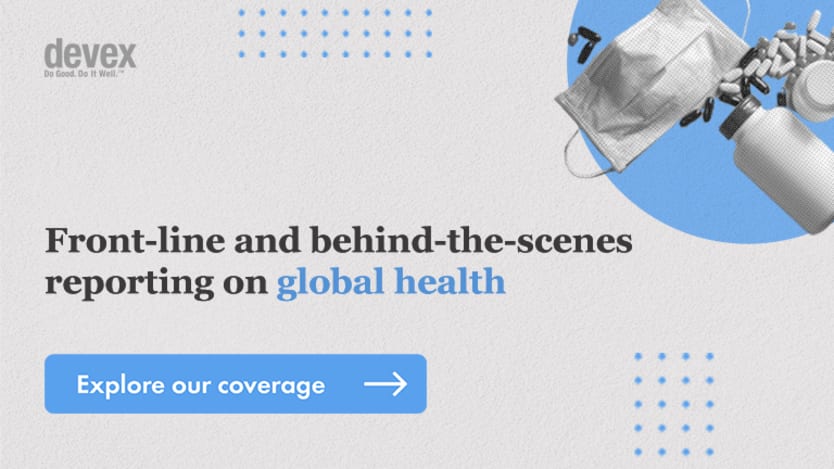
Could “Texas vaccine diplomacy” be the game changer the pandemic stricken world needs? Professor Peter Hotez, who coined the term, certainly hopes so — and others think it has the potential to be.
But this isn’t a secessionist approach to solving COVID-19 vaccine inequity. It’s a vaccine technology, developed by a team of 20 scientists led by Hotez and Maria Elena Bottazzi at Texas Children's Hospital Center for Vaccine Development. And it is patent-free — unlike any other vaccine yet developed.
TRIPS standoff continues in the new year
A new year has one nothing to ease the global standoff within the World Trade Organization over the waiver of the Trade-Related Aspects of Intellectual Property Rights, as the EU dismissed India's proposal to discuss it further as "premature."
“It’s all about this idea of decolonization, not empowering the multinational companies but empowering the really quality developing country vaccine manufacturers,” Hotez told Devex over video call. “That’s going to be essential for any pandemic, I think. We need to balance the ecosystem.”
Unlike newer messenger RNA vaccines — Pfizer’s iteration is reported to have made it, at least for a time, into one of the most powerful and wealthy companies on the planet — the Texas recombinant protein COVID-19 vaccine is produced by a yeast fermentation technology, which has been used for 30 years in the recombinant hepatitis B vaccine, according to Hotez.
So, he added, not only is it a “vegan” vaccine with no cells or proteins from humans or animals — raising the prospect of marketing it as “halal” in Indonesia — but the equipment needed to make it is already in place around the world.
Around 250 million doses of the vaccine are already being manufactured in India by Biological E, a Hyderabad-based company with experience making vaccines, who have dubbed their version Corbevax. It has been released for emergency use authorization in the country. Biological E has told Hotez that phase 1 and 2 clinical trials publications are in final draft form and will be submitted imminently. Phase 3 trials have found Corbevax to be “safe, well tolerated and immunogenic” according to Biological E.
Sign up for Devex CheckUp
The must-read weekly newsletter for exclusive global health news and insider insights.
“They are also in discussions with WHO for prequalification and EUL [emergency use listing] globally,” wrote Hotez in a follow-up email to Devex. Biological E did not respond to a request for comment by the time of publication.
The vaccine’s technology and production cell bank have already been transferred “at our own expense with no patents or strings attached” to companies in three other countries: Biofarma in Indonesia, Incepta in Bangladesh, and ImmunityBio in Botswana, according to Hotez. His team have had long-standing relationships with the Developing Countries Vaccine Manufacturers Network.
And it’s unlikely to stop there. “We’re still getting calls regularly now from countries all over the world desperate for a vaccine,” said Hotez. “They realize the big lie … that the mRNA [and other new] vaccines aren't coming anytime soon or with too many strings attached.”

Explaining the model these countries are looking to exploit, Hotez said: “We transfer the technology, no patent, and then the developing country vaccine manufacturer owns the vaccine that they scale up and produce.”
He continued: “First of all they scale up production, work out with their national regulators how to do this — in the case of Biological E in India it’s with the DCGI [Drugs Controller General of India], the Indian regulator, they work out production plan, the inspection of the facilities, and then work out a clinical trial plan, which … is usually done with the World Health Organization, so they seek input from the World Health Organization. They then make the determination on the clinical trials, what the criteria is for emergency use authorization, and also their publication plan as well, with the clinical development. So they own it … it’s up to them how they produce this, release it for use authorization, and how they publish their trial results.”
Unlike large pharmaceutical companies, the vaccine designed by the Texas Children's Center for Vaccine Development is “open source,” and the team has published “every aspect” of it. “We do that so anybody can reproduce our vaccine,” said Hotez. (The studies on it are published in academic journals such as Springer, Taylor & Francis, ScienceDirect, Science Immunology, and bioRxiv.)
“Maybe IP [intellectual property] has a role but I think IP can be a barrier to innovation, a barrier to access, and clearly this has been the case with this pandemic,” said Hotez.
Hotez said this was “decolonization” of global health. “I’m not trying to make money … people have a right to essential vaccines, it’s a fundamental human right.”
“All these models around the critical nature of intellectual property, we threw it under the bus and said ‘look, we’re just going to move forward with no patent’ and take that off the table and make it as simple and easy as we could possibly do it,” he added.
The project is how the international response to the pandemic “should have been since the beginning,” said Dr. Mohga Kamal-Yanni, senior health policy adviser to The People’s Vaccine Alliance. She added: “If it really works and quickly goes into clinical trials and all that, it could be really be a huge game-changer. But who’s funding them?”
“It’s all about this idea of decolonization, not empowering the multinational companies but empowering the really quality developing country vaccine manufacturers.”
— Peter Hotez, vaccine co-developer, Texas Children's Hospital Center for Vaccine DevelopmentUnequal access to vaccines has been a consistent theme of the pandemic. While higher-income countries secured millions of doses relatively easily, low-income countries have struggled to produce shots or have had to rely on donations, which have come slowly.
Only 10% of people in low-income countries have received at least one dose of a COVID-19 vaccine, according to Our World In Data.
Hotez said his team has had no major donor support, and the work has been funded by smaller philanthropies, mostly in Texas. The Coalition for Epidemic Preparedness Innovations, which is funded by major donors, has donated $5 million to Biological E to scale Corbevax.
By contrast, public investment in vaccines, which have been hard for lower-income countries to source, has been vast. The German government reportedly gave $445 million to BioNTech, which co-created the Pfizer vaccine. But a statement provided to Devex by the country’s Federal Ministry of Health said “funding for vaccine production by Biological E is not planned.”
The lack of WHO emergency use listing appears to be a barrier to further funding for the project, with statements sent to Devex from both the French and U.S. governments saying they only purchased vaccines that had this status. Meanwhile, the United Kingdom’s funding for vaccines is delivered through CEPI.
But Hotez added that while low- and middle-income countries’ pharmaceutical companies producing the vaccines needed funding, his team also needs backing. “We need to pay our scientists like everyone else,” he said.
And Hotez sees his team’s work as a race against time. “We only have a few months to do this before the next variant of concern emerges,” said Hotez. “Mother nature is not being coy — she's telling us what she’s going to do — unless we can move fast to vaccinate the world, she’s gonna hurl another terrible variant of concern at us.”







